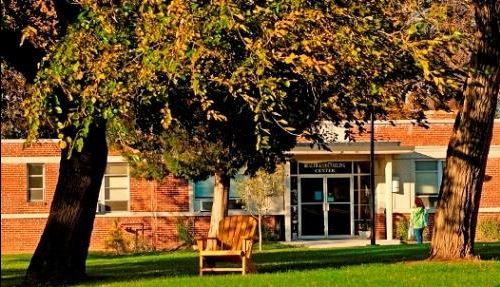COVID-19 Changes Health Center Procedures
By Alicia Method, Staff Writer
As students traversed campus this semester, they met a maze of arrows directing traffic and a sea of multicolored masks on every sidewalk. Like all facilities on campus, the Gettysburg College Health Center found itself having to make a number of changes to tackle the current public health crisis and create a safe environment for students at this time.
According to Director of Health Services Judith Williams, the Health Center utilized extensive research and the services of Johns Hopkins and the American College Health Association. Together they created a plan for physical and processing changes.
Some of these processing changes included changing visit times to minimize students waiting in the waiting room, educating staff on best practices to reduce exposure to COVID-19 and frequent cleaning of every room after appointments. Physical changes involved the implementation of triage, a video doorbell, and symptom screenings for possible viruses. If a positive screening is received, the student is directed to the West end of the building. From there they are taken to an exam room with a negative airflow system installed.
Williams noted that the Health Center has been working with cross-campus teams since March, reviewing policies and creating procedures for quarantine, isolation, and testing. Additionally, their advisors, Keeling Associates, assisted the Health Center in recognizing a need for additional staff. As a result, a COVID-19 case manager (Vanessa Rice), registered nurse, and contact tracers have been implemented.
When discussing the recent surge of cases on campus and the de-densification process, Williams emphasized the Center’s ability to more effectively manage the COVID population.
“The reduction in numbers has given us some breathing space to do better,” she said.
“Health Services did not anticipate the large number of cases that presented so quickly,” Williams also noted in regards to the immense challenge that faced the Center. She continued to say that, “Priorities for containment had to be in place, with a virus no one had ever had to manage in the college environment.”
As for Counseling Services, sessions have moved to a completely virtual setting over Zoom. Dr. Bradley, Director of Counseling Services, commented that they are also asking students to call for appointments, as opposed to walking over. All staff is now required to work from home a few days of the week to reduce office density.
Bradley said they were “reluctant to switch to remote sessions but have found that they seem to work well. Research also confirms that remote sessions are generally as effective as in-person sessions.”
A brand new “offering” from the Counseling Center is the PEEPS program: Peers Educating and Encouraging Peers to Succeed. PEEPS are students who were extensively trained to provide support to their peers. These students are supervised by a professional staff but are confidential, meaning they are not required to report concerns of sexual assault to the college.
Dr. Bradley described this program saying, “Sometimes students feel their problems are not “bad” enough to see a staff counselor. Those students might consider meeting with a PEEP.”

